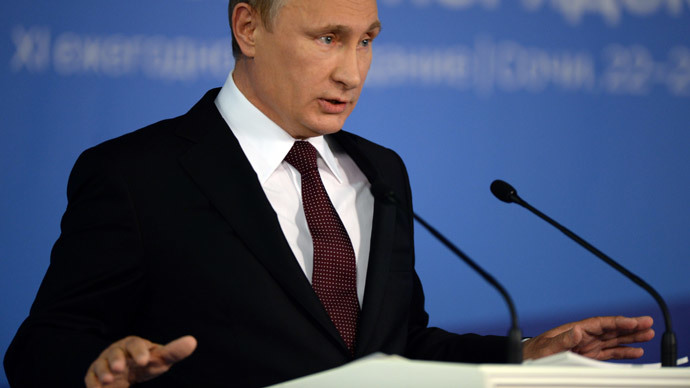Putin’s Valdai speech reflects Russia’s ‘strategic clarity, coherent policy’

Putin's speech at the Valdai Club reflects Russia’s overall strategic clarity of thought and a coherent long-term policy of resistance to the American monopolar unilateralism, foreign affairs analyst Srdja Trifkovic told RT.
RT:Apart from the very strong rhetoric, Putin said that Russia does not really see a strong menace on the part of the US, do you think Washington might stop seeing Moscow as a threat?
Srdja Trifkovic: No, I think US policy is guided by the geopolitical intentions, strategic design to surround and squeeze Russia at every point and if possible in the fullness of time to engineer regime change in Moscow. So the US policy and Western policy in general which is really the result of what US dictates to the Europeans, are not a result of a general perception of a Russian threat, rather they are guided by a long term geopolitical game which hasn't changed since the Cold War.
RT:Why do you think it has not changed towards Russia?
ST: Because in essence the Washingtonian policy makers do not see any difference in terms of geopolitical enemy whether it is the USSR or whether it is Russia. And effectively they really look upon Russia as the 'other' not only in political but also in cultural and emotional terms. And that is why you have such a strong, strident anti-Russian rhetoric at all levels of the Western establishment, whether it is politics or media.
RT:Do you think if the Western leadership acted differently towards Russia, then we would see a different stance from Putin?
ST: Oh, absolutely, because all along Russia has been responding to different signals from the West in an appropriate manner. When the rhetoric from the reset was all the rage, then we had a very conciliatory action from the Russians.

I think that even now, Russian response to the sanctions hasn't been strong enough. In fact it should be strong as to prompt the unions, the employers and the shareholders of the Western companies to lobby on their own governments to change policies towards Russia because it is beginning to hurt. But I think that Putin has very correctly diagnosed the nature of the international system as increasingly anarchic, and the one in which the US is trying to impose rules. But they are not real rules because they are applied on an entirely ad hoc basis from one situation to the other. Kosovo can be independent but Crimea cannot re-join Russia and so on.
So I think it is a very important speech because it reflects the clarity on the Russian side. So far we have seen different circles surrounding President Putin advising different things. And some of the captains of the Russian industry have been advocating more conciliatory line and then you have people like Rogozin or Shoigu who are advocating a more firm line and maybe foreign minister Lavrov somewhere in between. And now I think we have a very welcome development. We have a strategic clarity of thought which will result in a coherent policy and a long term a policy of resistance to American monopolar unilateralism.
The statements, views and opinions expressed in this column are solely those of the author and do not necessarily represent those of RT.












